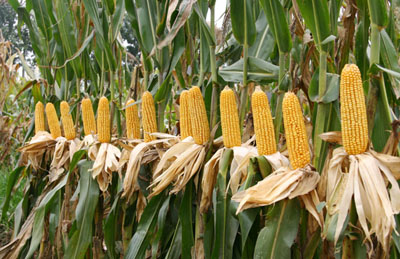The
market trend of corn in China in 2017 was facing a depressing time, especially
looking at the price development. Now, China has changed its corn policy from a
stockpiling and supply orientated market situation to one, that is demand
driven. Market
analyst firm CCM has analysed the key trends of corn in 2016 and gives an
outlook for the possible development of the corn market for 2017.

Source: Baidu
CCM’s
research reveals, that both the planting area of corn as well as the total
yield in 2016 have decreased in China. However, looking at the supply and
demand situation for corn in 2017, the demand is very likely to stay stable and
therefore the domestic supply will be enough to meet the total demand. As a
result, the planting areas are going to be reduced once again, while the price
of corn may even fall under the value of 2016.
2016
The
total planting area of corn decreased by 3.11% in 2016, compared to 2015. As a
result, also the harvest of corn experienced a fall down by 5 million tonnes
year on year. The total yield has been 219 million tonnes, according to CCM.
Looking
at the demand for corn feedstuffs and industry, both have shown an increase in
2016. This trend can be explained by the immense rise of live pig farming in
China, especially in the first half of 2016. Other factors, that favoured the
rise, has been dropping imports of substitutes for corn, namely sorghum,
barley, and DDGS. In numbers, the demand for corn feedstuffs has stated a
growth of 2 million tonnes in 2016, while corn industry even achieved a growth
of more than 4 million tonnes, according to CCM.
The
price of corn in China in 2016 was suffering a low value, compared to 2015.
This was mainly due to the weakening supply and demand situation, combined with
China’s corn stockpiling strategy. However, even the low domestic corn prices
were still higher than the imported prices, which showed an average price of
about USD50/t higher than domestic prices.
The
import of corn fell dramatically in China in 2016, namely by 42.5%, according
to CCM’s research. The biggest exporting nation with a share of almost 90% was
Europe’s corn field, the Ukraine.

2017
CCM
predicts, that the supply-demand situation for corn in China will remain
imbalanced in 2017, with a surplus of supply, even facing a continuing
decreasing planting area. The reason is the huge stockpile of corn, that will
be used to meet the demand as well.
CCM
has analysed four main reasons, that are very likely to surge the corn demand
in China in the year 2017. According to the research, China plans to offer
export subsidies for deeply processing products. Especially in the northern
part of China, subsidies for deep-processing enterprises are going to be
implemented. Corn-based fuel is very likely to grow in 2017, which will raise
the demand for corn as the raw material. Finally, a rising live pig market will
demand more corn, which will be hardly substituted by decreasing imports of
substitutes as well as less wheat usage.
As
mentioned before, the planting area of corn will be further decreased in 2017
as part of the restructure plan of corn planting. The area of effect will be
about 666 thousand ha.
CCM
predicts, that the price of corn in China, 2017, will be even lower than it was
in 2016. The final trend is surely depended on the market and supply situation,
but the changing strategy of China’s government to not buy any corn itself, but
support domestic enterprises to buy the corn. This changing policy puts a huge
pressure on the corn price in 2017.
What’s
more, according to Reuters, another plan of China’s government to reduce its
massive corn inventory, is the investment in the bioplastic industry, with corn
as the raw material. The products, that can be made from corn are bio-plastic
commodities like bags or plates. Most of the corn inventory of China’s
government consists of poor quality corn, that is not eatable by its
population. Therefore, the use fits either for feed or bio-plastic production.
About CCM:
CCM is the leading market intelligence provider for China’s agriculture, chemicals,
food & ingredients and life science markets.
Do
you want to find out more about the agricultural market in China? Try
our Newsletters and Industrial Reports or join our professional online
platform today and get insights in Reports, Newsletter, and Market Data at
one place.
For
more trade information of corn, including Import and Export analysis as well as
Manufacturer to Buyer Tracking, visit our experts in trade
analysis to get your answers today.
Looking
for a convenient way to get comprehensive and actual information as well as a
platform to discuss with peers about the latest agricultural industry
and market trends? Simply subscribe to our YouTube Channel and join
our groups on LinkedIn and Facebook.